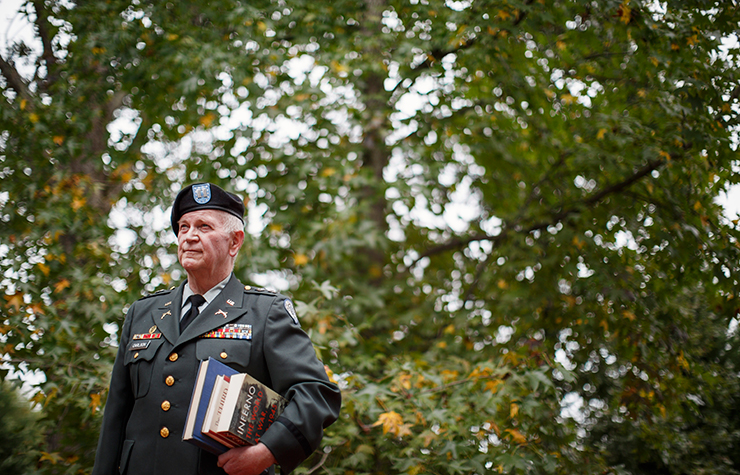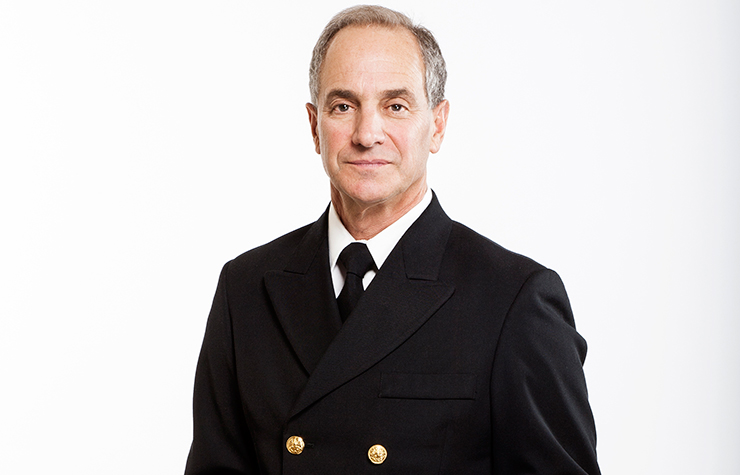AARP Hearing Center


The Taliban rocket slammed into Forward Operating Base Shank in Afghanistan right at suppertime. It was a Friday evening in 2009. Soldiers at the base, also known as Rocket City, scrambled from the mess hall and ran for sandbagged bunkers.
Except for one man. Capt. Sam Carlson picked up his tray loaded with lobster and steak and sauntered to the bunker. He sat on an ammo box and started to eat. "Hell, I'm not gonna let those guys screw with surf-and-turf night," the then-62-year-old intelligence officer later recalled.
The ranks of troops in war are filled with youngsters — but there are exceptions. Each year since 9/11, several people over 50 have reenlisted or signed up for the first time in their lives. This past year, nine people over 50 enlisted, according to a Defense Department spokeswoman. For some, the terrorist attacks on America provided the motivation to enlist. For others, it was seeing the need to help as casualties mounted in Iraq and Afghanistan. For the most part, they've been welcomed as experienced assets, not liabilities. It wasn't always easy to make the transition to the military. They needed age waivers, and the processing often took more than a year. The oldest active duty age limit for the Army is 35; for the Navy, 34; for the Marines, 29; for the Air Force, 39; and for the Coast Guard, 27.
Fearless at 50
Something about being 50 frees us up to be a little more … fearless. Because at 50 you finally know who you are. And if not, you're not afraid to make it up. Check out these videos for inspiration: aarp.org/fearless50
Because of their experience and expertise, they may be commissioned as field grade officers — major, lieutenant colonel, colonel and their equivalent in Navy ranks. Even so, many of them took a substantial cut from their civilian incomes and often had to overcome resistance from friends and relatives.
Most older volunteers are doctors and dentists, whose skill sets the military greatly needs, but some bring other credentials to the table — like Carlson, who served in several roles, including in the military police and as an intelligence officer, from 1967 to 1987. Carlson's grandfather served in World War I, his father in World War II and Korea. His son served in the first Gulf War and in Afghanistan; his grandson served in the second Gulf War.
Carlson enlisted in the Army at age 20 in 1967 and spent the next 20 years in uniform. In 2005, at age 58, he was recalled to active duty. He served two years at Fort Meade, Md., then volunteered for Afghanistan in 2007, serving with the 82nd and 101st Airborne Divisions. He retired again in 2008, only to be called up to serve as an intelligence officer with the 10th Mountain Division at Forward Operating Bases Shank and Airborne. At Shank he was known as OCITA — oldest captain in the Army.
But he was not alone. Here are the stories of some others who are serving, or have recently served, after turning 50.
Name: LAWRENCE BONE, 68
Rank: Lieutenant colonel, Army
Status: Retired, November 2015
It was a call no parent wants to get.
Lawrence Bone, then 58, was working as a successful orthopedic surgeon in Buffalo, N.Y., when he got the 21st-century equivalent of uniformed officers ringing his home's doorbell. In 2006, the Army caller told him that his son, Christian, had been wounded by a roadside bomb while serving with the 101st Airborne Division in Iraq. It had blown up his Humvee.
His son survived, was awarded a Purple Heart and went on to earn a nursing degree.
As a result of his son's injury, the father felt obligated. He left his practice, joined up and was commissioned a lieutenant colonel in the Army Reserve in 2011 at age 63. "I felt that because someone had taken care of my son, I should take care of them," he says. Since then, he served two tours in Afghanistan as a reserve medical officer, including a stint at Forward Operating Base Shank south of Kabul. It was, as the grunts say, "a bullet magnet."
Enlisting or re-upping at a nontraditional age takes time. For Bone, it took 21 months, lots of paperwork and background checks. Even so, an assistant secretary of the Army had to sign a waiver for him. Bone had to qualify with weapons and pass a fitness test, "which I did with a score of 300, the highest I could get."
Bone gave up his chairmanship of the orthopedic department at the University at SUNY Buffalo to deploy to Afghanistan for nine months.
Now 68, Bone faces a mandatory retirement date this month. Of his two tours in Afghanistan, he says, "My orthopedic specialty is trauma. War seemed to be a natural extension of my life." As for leaving the service, he says, "My only regret is that I didn't get in sooner so I could have done more."
(Video) AARP Salutes Col. Frederick Lough: Col. Frederick Lough joined the US Army Medical Corps Reserves at 58 and was deployed twice to Afghanistan where he performed hundreds of surgeries in tents. He was awarded the Bronze Star Medal for his service.



























































.jpg)



More From AARP
These Companies Are Hiring During Coronavirus Shutdowns
Unemployment is rising, but these essential businesses need workers
Small Businesses Can Get Help Covering Costs of Coronavirus Shutdowns
Federal government taking steps to ease financial pain